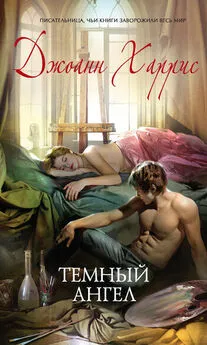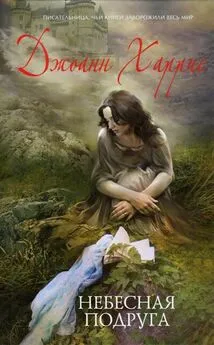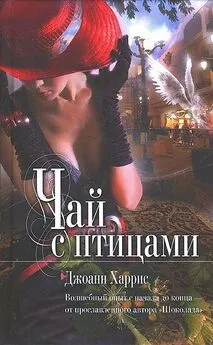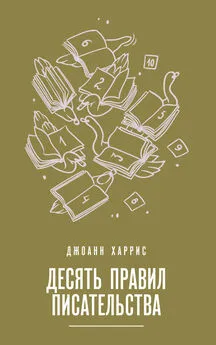Джоанн Харрис - Шоколад / Chocolat
- Название:Шоколад / Chocolat
- Автор:
- Жанр:
- Издательство:неизвестно
- Год:2021
- Город:Москва
- ISBN:978-5-04-117086-8
- Рейтинг:
- Избранное:Добавить в избранное
-
Отзывы:
-
Ваша оценка:
Джоанн Харрис - Шоколад / Chocolat краткое содержание
«Шоколад» – это история о доброте и терпимости, о противостоянии невинных соблазнов и закоснелой праведности. Одноименный голливудский фильм режиссера Лассе Халлстрёма (с Жюльетт Бинош, Джонни Деппом и Джуди Денч в главных ролях) был номинирован на «Оскар» в пяти категориях и на «Золотой глобус» – в четырех.
В формате PDF A4 сохранен издательский макет книги.
Шоколад / Chocolat - читать онлайн бесплатно ознакомительный отрывок
Интервал:
Закладка:
Another glance around the room. For a moment our eyes met.
“Closed to us,” he said quietly.
“Not as stupid as you look, are you?” said Muscat with sour glee. “We had enough of your lot last time. This time, we’re not standing for it!”
“OK.”
Roux turned to go. Muscat saw him off, strutting stiff-legged, like a dog scenting a fight. I walked past him without a word, leaving my coffee half-finished on the table. I hope he wasn’t expecting a tip.
I caught up with the river-gypsies halfway down the Avenue des Francs Bourgeois: It had begun to drizzle again, and the five of them looked drab and sullen. I could see their boats now, down in Les Marauds, a dozen of them – two dozen – a flotilla of green-yellow-blue-white-red, some flying flags of damp washing, others painted with Arabian nights and magic carpets and unicorn variations reflected in the dull green water.
“I’m sorry that happened,” I told them. “They’re not an especially welcoming lot in Lansquenet-sous-Tannes.”
Roux gave me a flat, measuring look.
“My name is Vianne,” I told him. “I have the chocolaterie just opposite the church. La Celeste Praline.”
He watched me, waiting. I recognized myself in his carefully expressionless face. I wanted to tell him – to tell all of them – that I knew their rage and humiliation, that I’d known it too, that they weren’t alone. But I also knew their pride, the useless defiance which remains after everything else has been scoured away. The last thing they wanted, I knew, was sympathy.
“Why don’t you drop in tomorrow?” I asked lightly. “I don’t do beer, but I think you might enjoy my coffee.”
He looked at me sharply, as if he suspected me of mocking him. -
“Please come,” I insisted. “Have coffee and a slice of cake on the house. All of you.”
The thin girl looked at her friends and shrugged. Roux returned the gesture.
“Maybe.” The voice was non-committal.
“We got a busy schedule,” chirped the girl pertly.
I smiled. “Find a window,” I suggested.
Again that measuring, suspicious look.
“Maybe.”
I watched them go down into Les Marauds as Anouk came running up the hill towards me, the tails of her red raincoat flapping like the wings of an exotic bird.
“Maman, Maman! Look, the boats!”
We admired them for a while, the flat barges, the tall houseboats with the corrugated roofs, the stovepipe chimneys, the frescoes, the multicoloured flags, slogans, painted devices to ward against accident and shipwreck, the small barques, fishing lines, pots for crayfish hoisted up against.the tidemark for the night, tattered umbrellas sheltering decks, the beginnings of campfires in steel drums on the riverside. There was a smell of burning wood and petrol and frying fish, a distant sound of music from across the water as a saxophone began its eerily human melodious wail. Halfway across the Tannes I could just make out the figure of a redheaded man standing alone on the deck of a plain black houseboat. As I watched he lifted his arm. I waved back.
It was almost dark when we made our way home. Back in Les Marauds a drummer had joined the saxophone, and the sounds of his drumming slapped flatly off the water. I passed the Cafe de la Republique without looking in.
I had barely reached the top of the hill when I felt a presence at my elbow. I turned and saw Josephine Muscat, coatless now but with a scarf around her head and half covering her face. In the semi-darkness she looked pallid, nocturnal.
“Run home, Anouk. Wait for me there.”
Anouk gave me a curious glance, then turned and ran off obediently up the hill, her coat-tails flapping wildly.
“I heard what you did.” Josephine’s voice was hoarse and soft. “You walked out because of that business with the river people.”
I nodded. “Of course.”
“Paul-Marie was furious.” The stern note in her voice was almost admiration. “You should have heard the things he was saying.”
I laughed.
“Fortunately I don’t have to listen to anything Paul-Marie has to say,” I told her blandly.
“Now I’m not supposed to talk to you any more,” she went on. “He thinks you’re a bad influence.” A pause, as she looked at me with nervous curiosity. “He doesn’t want me to have friends,” she added.
“Seems to me I’m hearing rather too much about what Paul-Marie wants,” I said mildly. “I’m not really all that interested in him. Now you-” I touched her arm fleetingly. “I find you quite interesting.”
She flushed and looked away, as if expecting to find someone standing at her shoulder.
“You don’t understand,” she muttered.
“I think I do.” With my fingertips I touched the scarf which hid her face. “Why do you wear this?” I asked abruptly. “Do you want to tell me?”
She looked at me in hope and panic. Shook her head. I pulled gently at the scarf.
“You’re pretty,” I said as it came loose. “You could be beautiful.”
There was a fresh bruise just beneath her lower lip, bluish in the failing light. She opened her mouth for the automatic lie. I interrupted her.
“That’s not true,” I said.
“How can you know that?” Her voice was sharp. “I hadn’t even said?”
“You didn’t have to.”
Silence. Across the water a flute scattered bright notes among the drumbeats. When she spoke at last her voice was thick with self-loathing. “It’s stupid, isn’t it?” Her eyes were tiny crescents. “I never blame him. Not really. Sometimes I even forget what really happened.” She took a deep breath, like a diver going under. “Walking into doors. Falling downstairs. St-stepping on rakes.” She sounded close to laughter. I could hear hysteria bubbling beneath the surface of her words. “Accident-prone, that’s what he says I am. Accident-prone.”
“Why was it this time?” I asked gently. “Was it because of the river people?”
She nodded.
“They didn’t mean any harm. I was going to serve them.” Her voice rose shrilly for a second. “I don’t see why I should have to do what that bitch Clairmont wants all the time! Oh we must stand together,” she mimicked savagely. “For the sake of the community. For our children, Madame Muscat”– breaking back into her own voice with a stricken intake of breath – “when in normal circumstances she wouldn’t say hello to me in the street – wouldn’t give me steam off her shit!” She took another deep breath, controlling the outburst with an effort. “It’s always Caro this, Caro that. I’ve seen the way he looks at her in church. Why can’t you be like Caro Clairmont?” Now she was her husband, his voice thick with beery rage. She even managed his mannerisms, the thrust-out chin, the strutting, aggressive posture. “She makes you look like a clumsy sow. She’s got style. Class. She’s got a fine son doing well at school. And what have you got, he?”
“Josephine.”
She turned towards me with a stricken expression.
“I’m sorry. For a moment I almost forgot where?”
“I know.”
I could feel rage pricking at my thumbs.
“You must think I’m stupid to have stayed with him all these years.”
Her voice was dull, her eyes dark and resentful.
“No, I don’t.”
She ignored my reply. “Well I am,” she declared. “Stupid and weak. I don’t love him – can’t remember a time when I ever loved him – but when I think of actually leaving him-” She broke off in confusion. “Actually leaving him,” she repeated in a low, wondering voice. “No. It’s no use.” She looked up at me again and her face was closed, final. “That’s why I can’t talk to you again,” she told me in calm desperation. “I couldn’t leave you guessing – you deserve better than that. But this is how it has to be.”
“No,” I told her. “It doesn’t.”
“But it does.” She defends herself bitterly, desperately, against the possibility of comfort. “Can’t you see? I’m no good. I steal. I lied to you before. I steal things. I do it all the time!”
Gently: “Yes. I know.” The clear realization turns quietly between us like a Christmas bauble. “Things can be better,” I told her at last. “Paul-Marie doesn’t rule the world.”
“He might as well,” retorted Josephine mulishly.
I smiled. If that stubbornness of hers could be turned out instead of in, what could she not achieve? I could do it, too. I could feel her thoughts, so close, welcoming me in. It would be so easy to take control… I turned the thought aside impatiently. I had no right to force her to any decision.
“Before, you had no-one to go to,” I said. “Now you do.”
“Do I?”
In her mouth, it was almost an admission of defeat.
I did not reply. Let her answer that for herself.
She looked at me in silence for a while. Her eyes were full of river lights from Les Marauds. Again it struck me, with what small a twist she might become beautiful.
“Goodnight, Josephine.”
I did not turn to look at her, but I know she watched me as I made my way up the hill, and I know she stood watching long after I had rounded the corner and disappeared from sight.
15
Tuesday, February 25
Still more of this interminable rain. It falls like A piece of the sky upended to pour misery onto the aquarium life below. The children, bright plastic ducks in their waterproofs and boots, squawk and waddle across the square, their cries ricocheting off the low clouds. I work in the kitchen with half an eye to the children in the street. This morning I unmade the window display, the witch, the gingerbread house and all the chocolate animals sitting around watching with glossy expectant faces, and Anouk and her friends shared the pieces between excursions into the rainy backwaters of Les Marauds. Jeannot Drou watched me in the kitchen, a piece of gilded pain d’epices in each hand, eyes shining. Anouk stood behind him, the others behind her, a wall of eyes and whisperings.
“What next?” He has the voice of an older boy, an air of casual bravado and a smear of chocolate across the chin. “What are you doing next? For the display?”
I shrugged. “Secret,” I said, stirring creme de cacao into an enamel basin of melted couverture.
“No, really.” He insists. “You ought to make something for Easter. You know. Eggs and stuff: Chocolate hens, rabbits, things like that. Like the shops in Agen.”
I remember them from my childhood; the Paris chocolateries with their baskets of foil-wrapped eggs, shelves of rabbits and hens, bells, marzipan fruits and marrons glaces, amourettes and filigree nests filled with petits fours and caramels and a thousand and one epiphanies of spun-sugar magic-carpet rides more suited to an Arabian harem than the solemnities of the Passion.
“I remember my mother telling me about the Easter chocolates.”
There was never enough money to buy those exquisite things, but I always had my own cornet surprise, a paper cone containing my Easter gifts, coins, paper flowers, hard-boiled eggs painted in bright enamel colours, a box of coloured papier-mache – painted with chickens, bunnies, smiling children amongst the buttercups, the same every year and stored carefully for the next time encasing a tiny packet of chocolate raisins wrapped in Cellophane, each one to be savoured, long and lingeringly, in the lost hours of those strange nights between cities, with the neon glow of hotel signs blink-blinking between the shutters and my mother’s breathing, slow and somehow eternal, in the umbrous silence.
“She used to say that on the eve of Good Friday the bells leave their steeples and church towers in the secret of the night and fly with magical wings to Rome.”
Читать дальшеИнтервал:
Закладка:

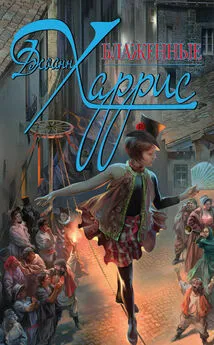
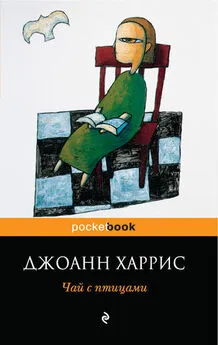
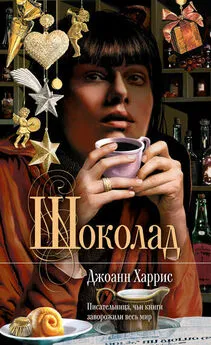
![Джоанн Харрис - Земляничный вор [litres]](/books/1072539/dzhoann-harris-zemlyanichnyj-vor-litres.webp)
![Джоанн Харрис - Джентльмены и игроки [litres]](/books/1087279/dzhoann-harris-dzhentlmeny-i-igroki-litres.webp)

